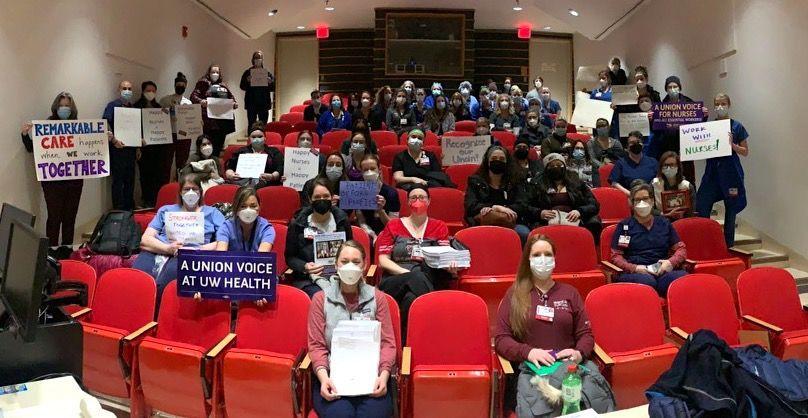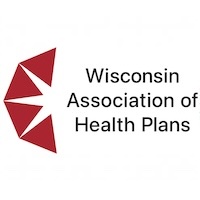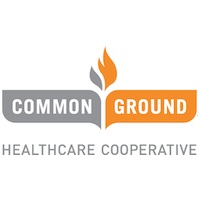
UW Health nurses provide official advanced notice of strike

UW Health nurses on Friday will provide health system officials advanced notice of a strike planned for later this month following a nearly three-year pushfor union recognition.
Last week, hundreds of nurses voted to authorize the move. System leaders won’t recognize their union due to a 2011 state law that curbed collective bargaining rights for most public employee unions.
Nurses see the strike, which is set to start at 7 a.m. on Sept. 13 and end at 7 a.m. on Sept. 16, as the next step.
“This isn’t a decision that we’ve made lightly,” said Amelia Zepnick, a float nurse who works in multiple departments at the system. “If they choose to continue to not recognize our union, we will go forward with it.”
In addition to Zepnick, Wisconsin Health News spoke with Becky McConnell, who works at the health system’s neurology clinic and has been a nurse for 25 years, and Will Kiesling, a nurse who works with children with complex and chronic health issues.
UW Health spokeswoman Emily Kumlien said Thursday they’re focused on “continued safety and quality care for all patients, ensuring patient care is impacted as minimally as possible.”
“A strike will do nothing to alter the legal uncertainties surrounding the health system’s ability to collectively bargain,” she said.
Nurses say they’ve faced threats for organizing, with some saying that managers are telling them that striking could be considered voluntary resignation. Kumlien said UW Health “does not retaliate for supporting unions.”
“UW Health will continue to follow our policies and all applicable laws related to attendance, bullying and patient care standards,” she said. “Enforcing existing policies is not retaliation; it is responsible healthcare operations.”
Edited excerpts from the interviews with the nurses are below.
WHN: Why do you support a union?
Amelia Zepnick: I’ve only been a part of UW for three years. And so, at first, I joined the union because my understanding of unions was really small, and I just thought that if there’s a union that’s going to start, I want to be a part of that because I think they’re good things. And then as I continued to work at UW and continued to have interactions and awareness of how things worked—after three years, you kind of see the bugs in any organization—and what had previously, when I first started, felt really supportive through management and administration … what I ended up realizing was that we have all these great policies and all these great structures in place, but they aren’t always implemented and they aren’t always encouraged and they aren’t always followed through on. My manager might say, ‘Oh, that’s a great idea. I’m going to take that up the chain.’ And then nothing ever happens.
And so throughout the pandemic, the urgency of having bedside staff at the table, making decisions, making policies, implementing policies felt all the more important and it became clear that our voices weren’t being heard. And that’s when, for me, I became aware that the only way for us to really have a voice at the table and to have our opinions and our professional knowledge respected is to have a union and to have collective bargaining and negotiating.
Will Kiesling: I started about a year ago through our nurse residency program at UW Health. And so I got off of orientation around late October of last year. Throughout that time, we had pretty rough staffing, even for the children’s hospital. And I know it’s much worse on the adult side, but even for us, we had low staffing numbers, we had high acuity. Really what I guess convinced me, we had a couple of our care team leaders who are our charge nurses, higher-up people who have been there for a long time. And as the union representatives and those people started to put out more information, more literature, started pushing for the union a little bit harder, they talked to us about how things were different when we had a union, how we had more of a voice. People were listened to more. There were some times where staffing was better. There was a whole bunch of stuff that at least piqued my interest.
And then starting in March, staffing on P7, where I work, was pretty, pretty bad, especially at night, which is the time that I work. I remember coming off a shift, and I emailed or texted somebody like, ‘Hey, you know, can I get more union information?’ And I started getting involved from there. So, really, I guess the things that pushed me were staffing and safety issues on our floor.
Becky McConnell: I’ve been a nurse at UW Hospital for 19 years … Since we have lost our union, I have noticed a lot of discrepancies in how UW treats their employees and how patient care has suffered because of that. They are not interested in supporting the nurses they have in retention, and I’ve been involved with trying to get our union back for the last three years.
When we had a union, we had a voice. They listened to the nurses when we said, ‘Our staffing ratios are terrible. We’re not giving the best patient care that can be given.’ They would listen to us, and we would bargain that. We would get better staffing, and better staffing comes from better benefits and wages and retention. You can’t retain the nurses you have when you haven’t given them any raise in eight years. So we have to look at how do we retain these experienced nurses that know their specialties to give the best patient care that we can give. And they don’t look at it that way. We’re very dispensable. They just, they don’t care. They’re more worried about image than taking care of the patients and their staff.
WHN: Why do you see it as necessary to authorize a strike?
Becky McConnell: We have tried every avenue possible to try to get them to the table … (Attorney General Josh Kaul) gave his opinion and said that UW can recognize our union. There have been lawyers that say that they can. But they continue to say that they can’t. It’s a last-ditch effort because they told us that they would no longer engage in talks with nursing. And so we had to make a decision, a hard decision, that we need to stand up for our patients because it’s been very unsafe for a few years now. We have to do something drastic to make them listen and have them hopefully come to the table and just communicate with us and recognize our union.
Amelia Zepnick: I don’t know what else we could try besides striking. That’s kind of what’s led us here. We’ve tried everything else, and the administration just kind of says, ‘Nah.’ So we’re left with striking as our next step.
… While we’ve been organizing and working towards unionizing for three years, we did take a pretty hearty pause throughout the pandemic because I mean, frankly, I think the pandemic was hard for everybody. And we needed to focus on the tasks at hand and the crisis at hand. And now that things have kind of simmered down … the policies still aren’t changing, the supports we need aren’t changing. It’s one thing to do something one way in a crisis because it’s an emergency and that’s all you have. It’s another to keep going with the bare bones structure and not provide the tools that we need to be successful long term. And so what we’re seeing is that we started doing certain things during the pandemic because we had to do what we had to do to get by. And now that things are less acute, we’re still not having the tools we need to be supportive and to be successful. More and more policies are coming out about how the hospital is choosing to do things, but they’re not necessarily consulting with us, the nurses at the bedside. And when they do consult with us, the nurses at the bedside, we give our opinions, we give our experience and they go, ‘Eh,’ and kind of just do whatever, anyhow. That’s what I’ve observed.
So many of these things aren’t just—this feels bad to me in my heart. Like so many of these things are ultimately safety concerns and things that make me feel sad to be a part of this organization and make me feel afraid of what if somebody I care about gets sick and needs to go to UW? Will they be safe? Will they receive good care? Will the staff taking care of them have the tools they need to be able to provide them with safe, quality care? I don’t always know. It kind of depends on the day. And that terrifies me.
And as a result, I want to make it better. I’m a member of this community, along with being an employee of UW, and I want this to be a good organization for our community and be able to provide excellent care. Our motto is, ‘Remarkable healthcare.’ I want to do that. And we’re not right now.
Will Kiesling: It all relates back to patient safety. So we have been trying to get UW to recognize our union for years at this point, and they refuse to do it, regardless of legal opinions that say that they could, that sort of thing. And really, what our union push is for is for patient safety. I know on my floor, I have a lot of kids who have tracheostomies and ventilators. It’s very important that we have appropriate staffing because it can be very dangerous if we just don’t have enough people to do all the tests we need to get done and have someone be at the desk and make sure all the alarms are addressed. If we’re all in a room and an alarm goes off or a ventilator or something, that can put a child in a very dangerous situation.
… We have addressed this multiple times through all the avenues that have been presented to us by the administration. We’ve advocated for our patients. We’ve pushed for better staffing, for whatever we can to make sure that we retain experienced nurses, that we make sure that our patients are being taken care of as well as possible. And unfortunately, we have been not really listened to. We’ve been patronized. We haven’t been really taken seriously in a lot of ways. And things have only gotten worse over the last year in my experience when it comes to losing experienced nurses.
WHN: How are you preparing?
Will Kiesling: We have hundreds and hundreds of nurses that are prepared to collectively act and make sure that we are all protected. We’ve mentioned and made the decision that if we’re all going out, we’re all going back in. So we’re not going to accept any retaliation or intimidation tactics from the administration … Our strength is in our numbers.
Becky McConnell: We’re just standing together. We have each others’ backs. We have been getting retaliation and threats against nurses for trying to organize. UW is prepared to pay any (unfair labor practice) fines, and we are a very organized and determined group of nurses. We want patients to be safe.
WHN: Can you elaborate on what retaliation nurses have faced?
Becky McConnell: We do get threats about, you know, if we go on strike for three days, that is voluntary resignation, when in fact we’re giving them more than a 10-day notice than we’re required to and we’re on strike. We’re not resigning. I’ve heard that managers have been talking to nurses, asking them if they’re going on strike, that if they do strike, they will get disciplined. Things like that. And it has been getting worse in the last few weeks.
WHN: If this strike moves forward, what’s next? Are you considering an additional strike or other options?
Becky McConnell: We are. We are still discussing what our next steps would be, whether it would be extension, another strike or other legal steps.
Will Kiesling: That’s something that we’ve been trying to keep open ended. Because we don’t know how this is going to shake out. I think there are many different things that could happen. We’re hoping that we don’t have to get to the point where we have to strike. That’s increasingly looking unlikely, based off of how the administration has dug in refusing to recognize us. So we’re making those decisions. We have a few options. Another strike is on the table, possibly, but we’re hoping that even the initial strike doesn’t happen. We’re keeping our options open.

















.jpg?bwg=1612548324)













